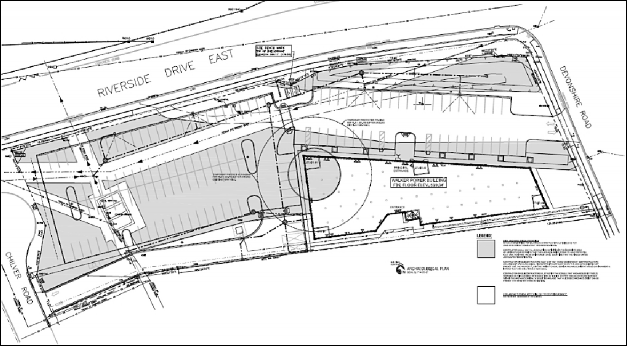Because of the railway turntable, MTCS considers the property as an archaeological site, and subject to Part VI, Section 48 (1) of the Ontario Heritage Act, which requires that no person knowing of an archaeological site may alter the site. Since the railway turntable situates within part of the building footprint and spans beyond the building footprint into other proposed development areas, MTCS has required that short term and long term protection measures be provided for the railway turntable.

Archaeological Plan submitted to the City by the owners showing the Site Plan with the Turntable and protected buffer area, as well as other areas of further archaeological potential.
MTCS provided City staff with a list of long-term protection tools for the turntable to assist in the management of this archaeological resource. The tools include the registration of the turntable as an archaeological site, designating the real property including the turntable under section 29 of the Ontario Heritage Act, and protecting the turntable through a Heritage Conservation Easement.
These protective tools were brought into the discussion during the sale of City lands to the Walker Power Building Inc. The sale was approved in principle by Council conditional to the Owner agreeing to enter into a Heritage Conservation Easement.
As the approval authority, the City of Windsor has to review development applications and be consistent with the Provincial Policy Statement, which states:
"2.6.2 Development and site alteration shall not be permitted on lands containing archaeological resources or areas of archaeological potential unless significant archaeological resources have been conserved. "
To be consistent with the Provincial Policy Statement, Administration is recommending a Heritage Conservation Easement and a Heritage Designation (subject to a future separate report) on the property. The Owner of 325 Devonshire Road, is agreeable to the recommendations of their licensed archaeologist to protect the railway turntable